Legal research is at the heart of every lawyer's practice, but navigating the complexities of the legal system can be time-consuming and difficult. With the rise of digital tools and AI-based tools for lawyers, researching and understanding laws is becoming more accessible and easier. In this post, we explore the top legal research tools for lawyers that can make work easier while maintaining or even improving accuracy and quality of service.
Legal service providers can reduce their costs and differentiate themselves from their competition by deploying legal tech. The legal tech market revenue is predicted to continue growing over the next few years, from $27.6 billion in 2021 to $35.62 billion in 2027.
Traditional legal research tools vs digital tools
Traditionally, lawyers had to rely on print materials like books and journals to search for relevant legal concepts and laws. This could be a tedious process that took up much of their time. However, with the emergence of digital tools, researching laws has become much easier than before. With such tools, it is now possible for lawyers to quickly find reliable and accurate legal information to stay up-to-date with the latest laws and regulations. Lawyers use online tools to verify legal opinions to support case law, check property records, and conduct eDiscovery.
eDiscovery tools
eDiscovery tools are used by lawyers when researching laws for cases. The tools enable lawyers to quickly find relevant information in large databases, such as court documents or emails. They work by using powerful search algorithms to pinpoint the most relevant documents and quickly process large volumes of data. This helps lawyers save time while conducting research and improves accuracy in their findings.
AI-based legal research tools
Lawyers can also take advantage of AI-based legal research tools to make their work more efficient and accurate. AI technology is helping lawyers automate mundane tasks such as document analysis and contract review, which would be very time consuming if performed manually. Furthermore, AI-based tools can help lawyers capture and analyze large amounts of data quickly and accurately to make informed decisions. While such tools are highly efficient, caution should be taken as they are not infallible and may require human oversight to ensure accuracy.
AI tools are vulnerable to a phenomenon called hallucinating, where the tool produces false results. To prevent this, it is crucial to understand how prompting affects AI, and to always double check elements such as citations. Using tools tailored for lawyers and law firms is also a safety measure, as they are usually trained with legal data, which makes them more accurate.
Top legal research tools for lawyers
Here is a list of some of the top solutions for lawyers. Some items on the list are free legal research tools or offer flexible pricing.
1. AnyLawyer
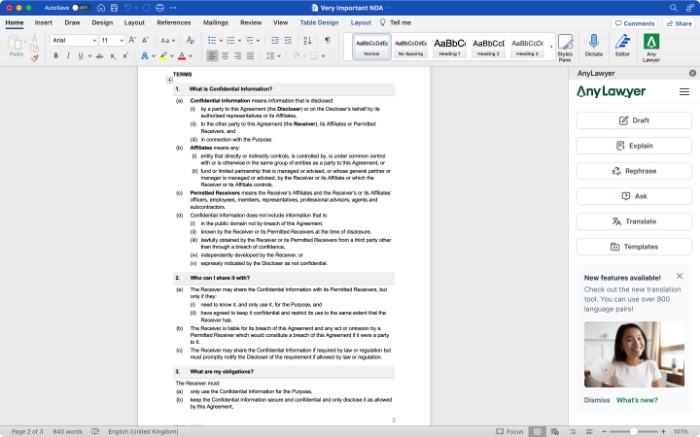
AnyLawyer is a cloud-based legal research platform. It provides easy access to US federal and state laws, supporting both textual and citation features. It also offers subscription services which include additional features such as docket tracking, case analysis trends, court analytics, litigation profiling, and more.
2. Casetext
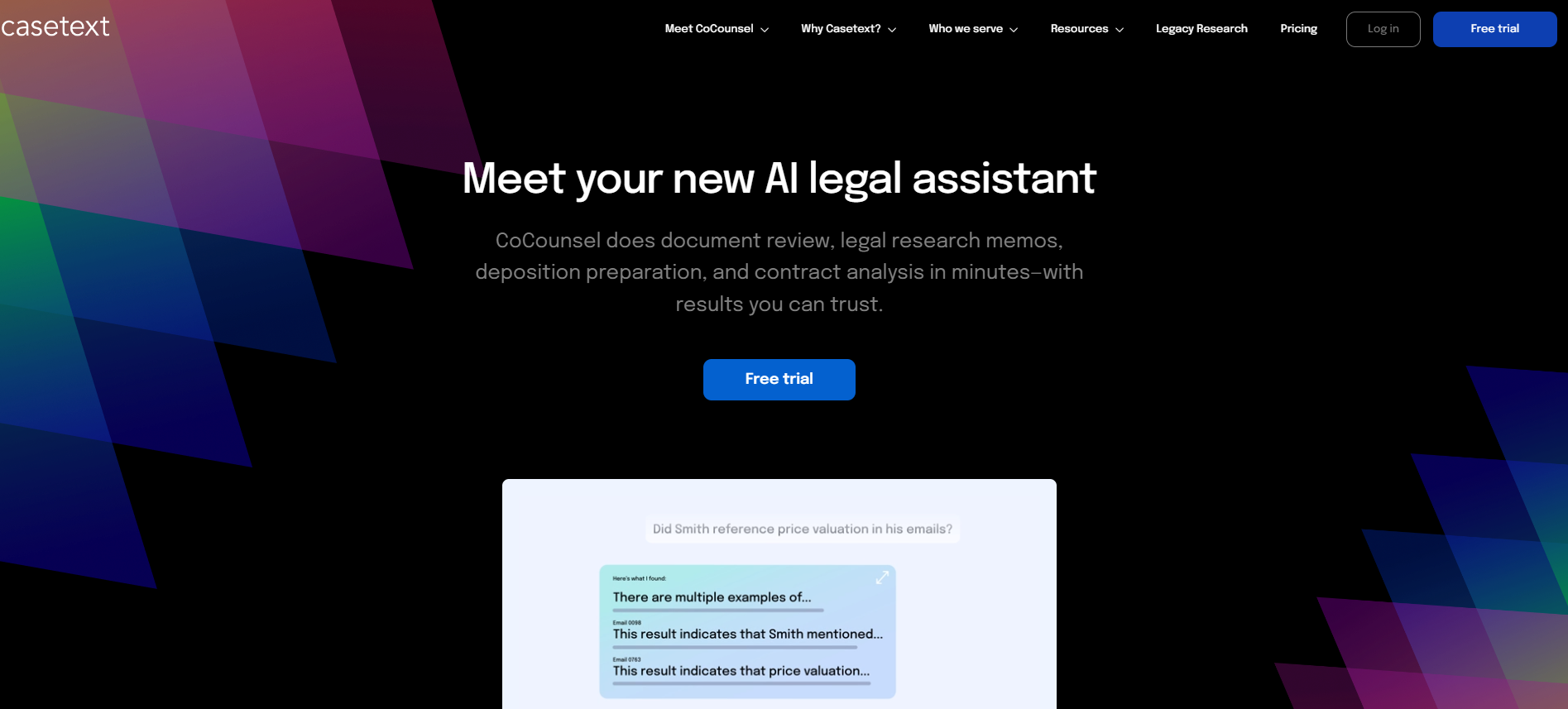
This AI legal assistant, powered by GPT-4, is designed to help lawyers quickly and accurately search through case law, federal statutes, regulations, and more. It also provides document review and offers natural language processing features that enable lawyers to ask legal questions in plain English. It is a great solution for deposition prep and contract revision.
3. Westlaw Edge
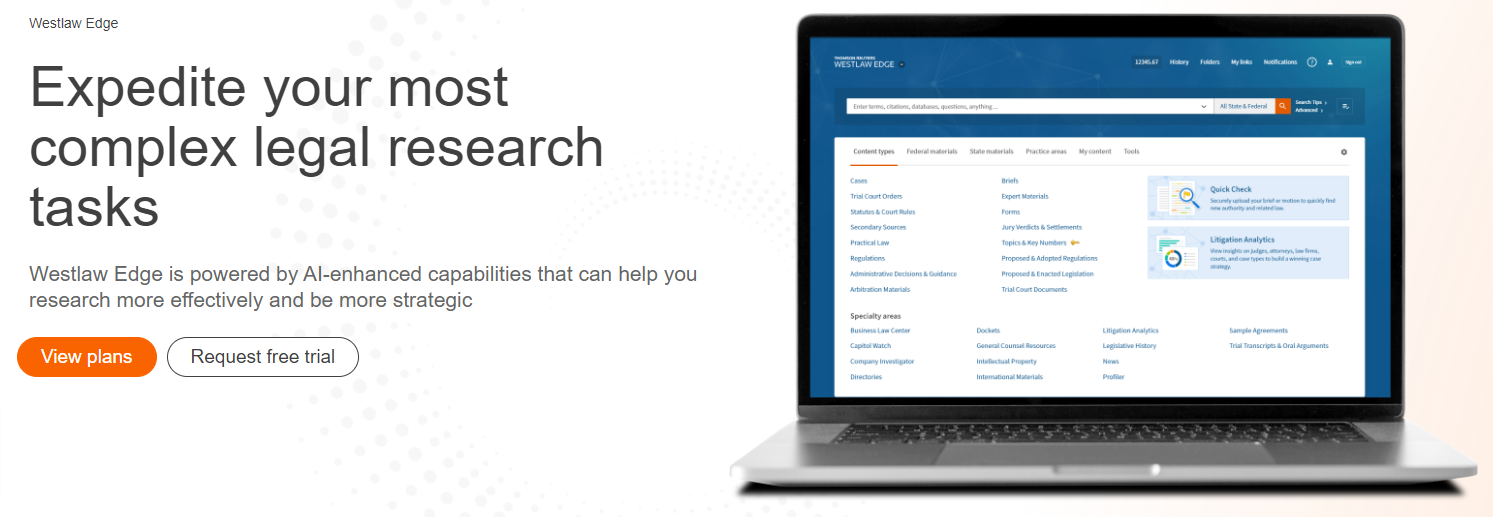
Thomson Reuters' Westlaw Edge enables lawyers to easily conduct comprehensive research using a single platform with access to hundreds of databases and other legal resources. It also provides AI-assisted features such as predictive search and auto-suggested content to help lawyers quickly find relevant information.
4. LexisNexis
This tool offers a range of research services from legal news and analysis to statutes and regulations. It also includes helpful features such as Smart Charts, which allows lawyers to quickly create charts based on their research results. The Lexis+ AI platform offers secure generative AI services, capable of assisting with research through prompted outputs, while Nexis is an excellent source of curated news.
5. Fastcase
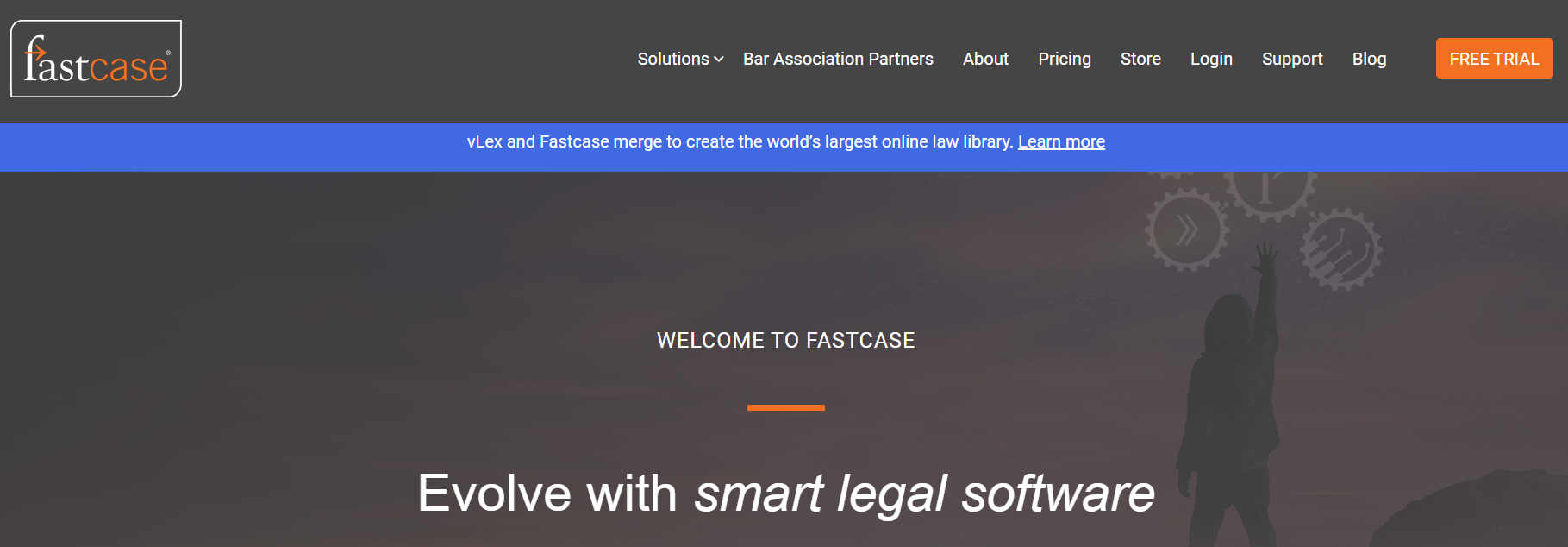
Fastcase provides access to millions of cases, statutes, and secondary sources for lawyers to quickly conduct legal research. It also includes features such as dynamic search tools that help lawyers find relevant information without having to manually search through multiple documents.
6. Logikcull
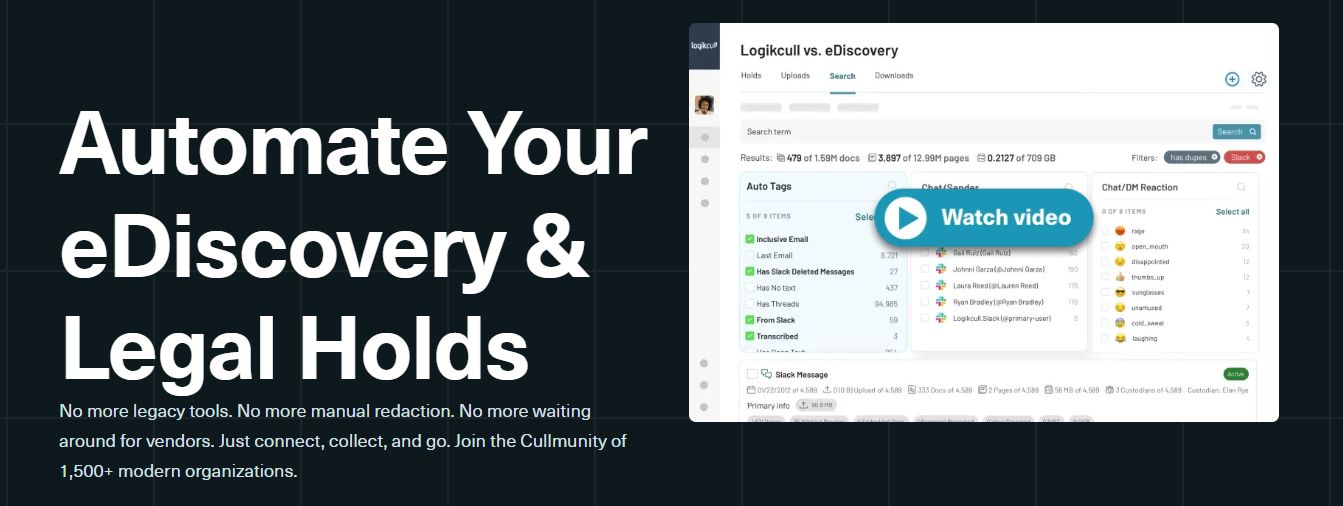
Logikcull is a cloud-based eDiscovery software that enables lawyers to quickly search through large amounts of data, such as emails and documents. It also provides machine learning capabilities for automated document review and analysis. Lawyers can easily share their findings with colleagues or clients using Logikcull’s secure platform. and powerful integrations
7. Ravel Law
This AI-powered legal research platform helps lawyers quickly search and analyze case law. It also includes features such as interactive visualizations, analytics, and predictive modeling to assist in researching laws faster. Additionally, Ravel Law's secure cloud storage allows lawyers to organize their findings for easy access later on.
8. Tracers

Tracers is an online research tool that allows lawyers to quickly search for public records, such as property deed records, or conduct thorough social media searches. It also facilitates communication with clients and other contacts through its secure messaging platform.
9. Caselaw Access Project
The Caselaw Access Project (CAP) is an open-source, free access library that enables lawyers to search for and access millions of cases from all US states. It includes features such as full-text searching and citation linking, making it a great tool for legal research. The data provided is edited and proofread by legal professionals to ensure accuracy.
10. FindLaw

FindLaw provides access to a wide range of legal resources, such as case law, statutes, and regulations. It also offers helpful features such as topic-based search results and an interactive case briefing tool. The tool is entirely free to use to ensure better access to legal materials.
11. CourtListener
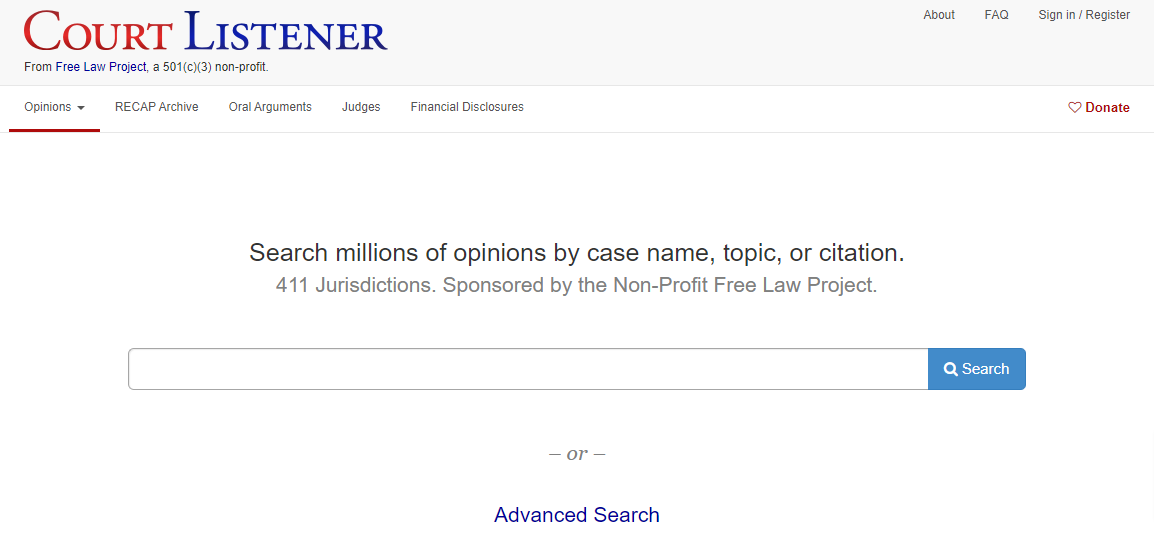
CourtListener is an open-source database of US federal and state court rulings. It includes features such as keyword searching, citation mapping, opinion summaries, and more. The platform is free to use and makes it easy for lawyers to quickly search legal documents.
12. Justia
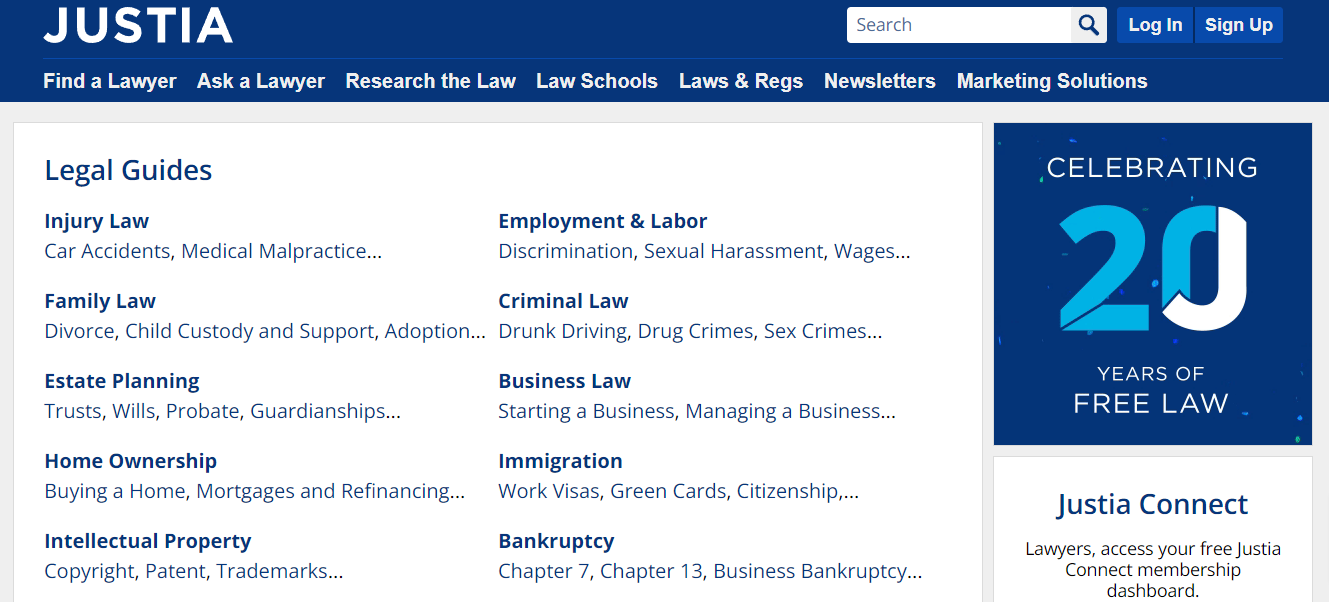
Justia is another excellent tool for legal research that provides access to federal and state statutes, as well as case law. It also offers helpful features such as a citation checker, searchable statutes by keyword, and an online legal dictionary.
13. Legal Information Institute
The Legal Information Institute (LII) is an open-access online library run by Cornell Law School. It provides access to legal materials such as primary sources, treatises, and law review articles for free. The LII's search engine supports Boolean operators, enabling lawyers to quickly find relevant information.
14. Google Keep
Google Keep is not a tool tailored for lawyers, but it can be used for that purpose too. This free app enables lawyers to quickly jot down notes and ideas while researching laws or talking with clients. It also provides other useful features such as reminders, checklists, and tags for organizing information.
15. Decisis
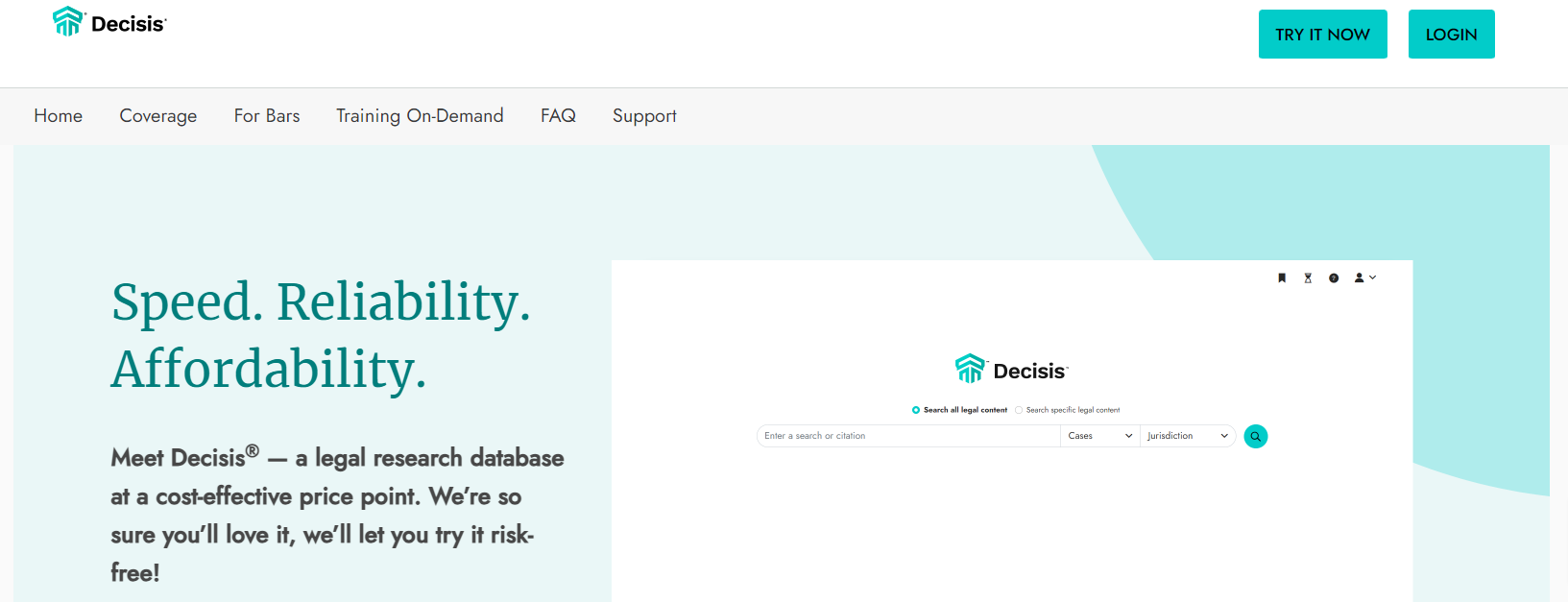
Decisis is a comprehensive and reliable citator and legal research database. It offers access to case law, statutes, regulations, and other legal materials sourced from a variety of court systems. The tool also includes features such as citation mapping and full-text searching for quick research results. It is a lightweight tool designed for solo lawyers and small firms.
16. Oyez
Oyez is an open-source platform providing free access to US Supreme Court oral arguments and opinions. It includes features such as audio recordings, transcripts, and summaries of each case. The tool also enables lawyers to quickly search through the entire database using keywords or citation information.
17. PACER
Public Access to Court Electronic Records, or PACER, provides access to court documents that can be searched by case name, party name, or docket number. It is a great tool for lawyers looking to quickly search and locate documents related to specific cases.
18. Evernote
Evernote is another popular note-taking app that can be used for legal research. The app makes it easy to save web pages, images, and other information while researching laws or preparing cases. It also provides features like reminders, tags, and the ability to share notes with colleagues or clients.
19. Google Scholar
Google Scholar is a great source of legal information for lawyers. With its advanced search capabilities, lawyers can quickly find relevant documents and case studies to help them in their research.
Getting started with a legal research tool
The legal research process depends on online tools, legal research software, databases, and other resources, even legal blogs. It is important to take the time to find the right tool that fits the needs and workflows of the law firm or legal team.
- Understand the types of legal resources available online before starting research. This will help in narrowing down the choices to tools best suited for the type of research that is needed.
- Consider the cost of the chosen tool. Some tools offer free versions with basic features while others require a monthly subscription or a one-time purchase fee.
- Look for user reviews and feedback on different legal research tools to get an idea of its usability and effectiveness.
- Once a tool is chosen, take advantage of any tutorials or support provided by the vendor to get the most out of it.
- Finally, experiment with different features and settings to make the research process more efficient and effective.
Online legal research tools FAQ
Q: Are online legal research services only for case law?
A: No, an online legal research service can be used for various types of legal research such as statutes, regulations, and secondary sources. Additionally, many of the tools on this list offer features that help lawyers quickly search through large amounts of data or communicate with clients or other contacts.
Q: How secure are AI-based legal research tools?
A: AI-based legal research tools are generally secure, but caution should be taken to ensure accuracy.
Q: What techniques can I use to ensure accuracy when using legal research tools?
A: To ensure accuracy when conducting legal research, it is important to understand the laws and regulations applicable to a given case. Much of what a research tool produces needs to be double checked by legal professionals to ensure accuracy.
Q: What tools are likely to be offered by a bar association?
A: Many bar associations offer online legal research tools to their members. These may include access to databases with case law, statutes, regulations, and more. Additionally, some bar associations provide extra support, such as tutorials on how to use the tools or discounted subscriptions for certain services.
Q: Is it possible to win a case with free research tools?
A: Yes, it is certainly possible to win a case with the help of free research tools. However, it is important to remember that these tools should be used in addition to legal research techniques and not as a substitute. Furthermore, the information found through these tools should always be double checked by a lawyer before being used in court.
Using paid and free legal research tools
In conclusion, legal research tools are an invaluable asset for lawyers. These tools can help them quickly and accurately find relevant legal information to make informed decisions in less time. While traditional research methods are still useful, digital and AI-based tools have become indispensable for many lawyers. With the right legal research tool, lawyers can gain a comprehensive understanding of the law and stay ahead of the competition.




